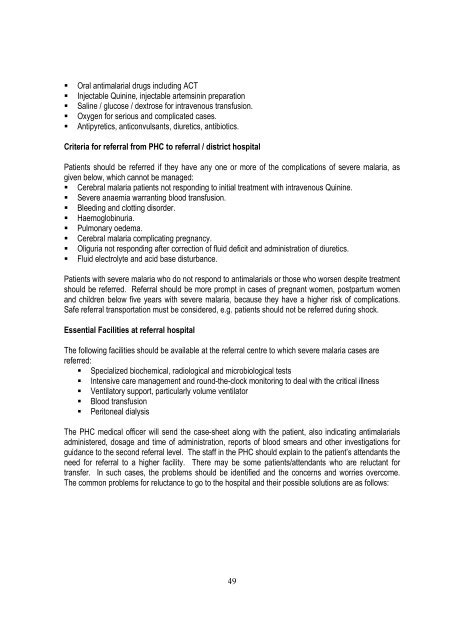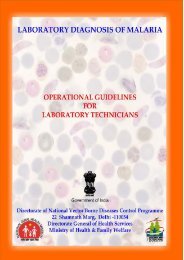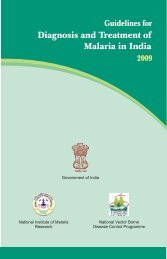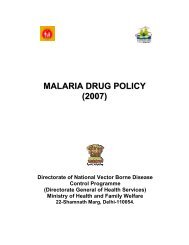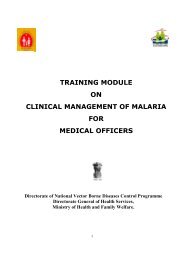training module for medical officers primary health centre - NVBDCP
training module for medical officers primary health centre - NVBDCP
training module for medical officers primary health centre - NVBDCP
- No tags were found...
You also want an ePaper? Increase the reach of your titles
YUMPU automatically turns print PDFs into web optimized ePapers that Google loves.
Oral antimalarial drugs including ACTInjectable Quinine, injectable artemsinin preparationSaline / glucose / dextrose <strong>for</strong> intravenous transfusion.Oxygen <strong>for</strong> serious and complicated cases.Antipyretics, anticonvulsants, diuretics, antibiotics.Criteria <strong>for</strong> referral from PHC to referral / district hospitalPatients should be referred if they have any one or more of the complications of severe malaria, asgiven below, which cannot be managed: Cerebral malaria patients not responding to initial treatment with intravenous Quinine. Severe anaemia warranting blood transfusion. Bleeding and clotting disorder. Haemoglobinuria. Pulmonary oedema. Cerebral malaria complicating pregnancy. Oliguria not responding after correction of fluid deficit and administration of diuretics. Fluid electrolyte and acid base disturbance.Patients with severe malaria who do not respond to antimalarials or those who worsen despite treatmentshould be referred. Referral should be more prompt in cases of pregnant women, postpartum womenand children below five years with severe malaria, because they have a higher risk of complications.Safe referral transportation must be considered, e.g. patients should not be referred during shock.Essential Facilities at referral hospitalThe following facilities should be available at the referral <strong>centre</strong> to which severe malaria cases arereferred: Specialized biochemical, radiological and microbiological tests Intensive care management and round-the-clock monitoring to deal with the critical illness Ventilatory support, particularly volume ventilator Blood transfusion Peritoneal dialysisThe PHC <strong>medical</strong> officer will send the case-sheet along with the patient, also indicating antimalarialsadministered, dosage and time of administration, reports of blood smears and other investigations <strong>for</strong>guidance to the second referral level. The staff in the PHC should explain to the patient’s attendants theneed <strong>for</strong> referral to a higher facility. There may be some patients/attendants who are reluctant <strong>for</strong>transfer. In such cases, the problems should be identified and the concerns and worries overcome.The common problems <strong>for</strong> reluctance to go to the hospital and their possible solutions are as follows:49


